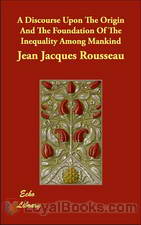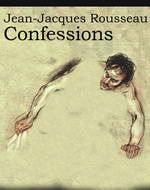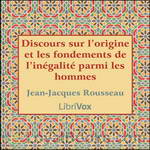|
Books Should Be Free Loyal Books Free Public Domain Audiobooks & eBook Downloads |
|
|
Books Should Be Free Loyal Books Free Public Domain Audiobooks & eBook Downloads |
|
Author Collection |
|---|
By: Jean-Jacques Rousseau (1712-1778) | |
|---|---|
 A Discourse Upon the Origin and the Foundation of the Inequality Among Mankind
A Discourse Upon the Origin and the Foundation of the Inequality Among Mankind
This work presents Rousseau’s belief in the profoundly transformational effects of the development of civilization on human nature, which Rousseau claims other political philosophers had failed to grasp. Specifically, before the onset of civilization, according to Rousseau, natural man lived a contented, solitary life, naturally good and happy. It is only with the onset of civilization, Rousseau claims, that humans become social beings, and, concomitant with their civilization, natural man becomes corrupted with the social vices of pride, vanity, greed and servility. | |
 The Social Contract
The Social Contract
The Social Contract outlines Rousseau’s views on political justice, explaining how a just and legitimate state is to be founded, organized and administered. Rousseau sets forth, in his characteristically brazen and iconoclastic manner, the case for direct democracy, while simultaneously casting every other form of government as illegitimate and tantamount to slavery. Often hailed as a revolutionary document which sparked the French Revolution, The Social Contract serves both to inculcate dissatisfaction with actually-existing governments and to allow its readers to envision and desire a radically different form of political and social organization. (Summary by Eric Jonas) | |
 Confessions
Confessions
Considered to mark the emergence of a new literary form, the unvarnished autobiography, Confessions by Jean-Jacques Rousseau was first published in 1782, four years after his death. The philosopher and educationist whose political philosophy is credited with having inspired the French Revolution, Rousseau was a man of immense wit, talent and depth of thinking. His skill in art, music, literature and cooking along with his magnificent body of work in philosophy, politics, education and sociology have made him a legendary figure... | |
 (French) Discours sur l'origine et les fondements de l'inégalité parmi les hommes
(French) Discours sur l'origine et les fondements de l'inégalité parmi les hommes
De l’inégalité parmi les hommes est un essai philosophique d’une centaine de pages environ, richement annoté par l’auteur, introduit par une lettre de louanges à la République de Genève ainsi que par une préface de l’auteur datée du 12 Juin 1754. | |
 (French) Discours sur les sciences et les arts
(French) Discours sur les sciences et les arts
Le Discours sur les sciences et les arts est un texte de Jean-Jacques Rousseau écrit dans le cadre du concours de l’Académe de Dijon de 1750. Lauréat du concours, Rousseau voit son essai fort commenté et lui doit sa célébrité, bien avant son opus magnum Du contrat social. Comme le veut le concours, le discours répond à une question : il s’agissait alors de déterminer « Si le rétablissement des sciences et des arts a contribué à épurer les mœurs ». Farouche critique des pratiques de son temps, l’auteur présente en deux parties une diatribe contre les sciences et les arts, qui bien loin d’épurer les mœurs éloignent les hommes de la vertu... | |
 The Confessions of J. J. Rousseau
The Confessions of J. J. Rousseau
| |
 Émile or, Concerning Education; Extracts
Émile or, Concerning Education; Extracts
| |